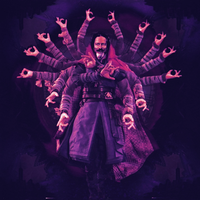
Agrarian Society - Akira the Don, Alan Watts
Альбом: WATTSWAVE IV: DREAMS
- Шығарылған жылы: 2018
- Тіл: Ағылшын
- Ұзақтығы: 4:25
Төменде әннің мәтіні берілген Agrarian Society , суретші - Akira the Don, Alan Watts аудармасымен
Ән мәтіні Agrarian Society "
Аудармасы бар түпнұсқа мәтін
Agrarian Society
Akira the Don, Alan Watts
Оригинальный текст
The Hindu
Divide life into certain stages
What are called the Ashamas
The first is called Brahmacarya
The second Grehasta
And the third Vanaprastha
Brahmacarya
Means the stage of the student, the apprenticeship
Grehasta the stage of the householder
And Vanaprastha
The stage of the forest dweller
This is related
To the cultural history of early India
Before we have agrarian communities
We have a hunting culture
Which is on the move
In a hunting culture
Every male
Knows the whole culture
There is no division of labor
And the holy man of the hunting culture
Is of course called a Shaman
A Shaman
Is a
A realized man
A man who knows the inner secret
He’s seen through the gate
And he finds it by going away alone into the forest
And cutting himself off
From the tribe
That is to say from social conditioning
And he goes maybe for a long period into the forest
And comes back
He’s found out who he is
And he sure as who he was told he was
But as hunting cultures settled into agrarian patterns of life
What do they do?
They build a village
And around the village they set up a stockade
Which is known as the Pale
And the village is always of course standing at crossroads
And there you get in an agrarian society a division of labor
And the division of labor comprises four
In Medieval Europe we call them Lord spiritual
Lords temporal
Commons
And Serves
In India they are
Brahmins
Chatria
That means fighter
Vaicher
Merchants
Traders
Chutara
Labour’s
So, you’ve got the priests
The warriors
The merchants
And the laborers
Division of labor
The four Sections of town
So, the four basic casts
So, when you are born you are born into a caste
And your duty as a Grehasta or householder
Is to fulfill your caste function
And to bring up a family
When you’ve done that
You go back to the forest
Back to the hunting culture
And you drop your role
And you become nobody
A shaman again
So a Hindu calls one who does this
Ashramana which is of course the same word as Shaman
And the Chinese called him a Shia
A Shaman is an immortal
Why immortal?
Because it’s only the role that’s mortal
The big front
The persona
The one who you really are
The common man that is to say the man who is common to us all
Which you could call the son of man
That’s the real self
That’s the guy who’s putting on the big act
And of course, he has no name
Nobody can put a finger on him
Because
You can’t touch the tip of the finger with the tip of the finger
Перевод песни
Үнділер
Өмірді белгілі бір кезеңдерге бөліңіз
Ашамалар деп нені атайды
Біріншісі Брахмакарья деп аталады
Екінші Грехаста
Ал үшінші Ванапраста
Брахмачария
Студенттің сахнасы, шәкірт
Грехаста үй иесінің кезеңі
Және Ванапраста
Орман тұрғынының кезеңі
Бұл байланысты
Ертедегі Үндістанның мәдени тарихына
Бізде аграрлық қауымдастықтар болғанға дейін
Бізде аңшылық мәдениеті бар
Қай қозғалы
Аңшылық мәдениетінде
Әрбір еркек
Бүкіл мәдениетті біледі
Ешқандай еңбек бөлінісі жоқ
Аңшылық мәдениетінің киелі адамы
Әрине шаман деп аталады
Шаман
Бұл
Түсінген адам
Ішкі сырын білетін адам
Ол қақпадан көрінді
Оны ол орманға жалғыз кетіп бара жатып табады
Және өзін кесіп тастады
Тайпадан
Бұл әлеуметтік жағдайдан айту керек
Және ол орманға ұзақ уақытқа созылады
Және қайтып келеді
Ол өзінің кім екенін білді
Және ол өзінің кім екеніне сенімді болды
Бірақ аңшылық мәдениеттер өмірдің аграрлық үлгілеріне қонды
Олар не істейді?
Олар ауыл салады
Ал ауылдың айналасына қоршау қор қорған қор қор қор қор
Ол бозарған белг белгілі белгілі белгілі Бозғыл белгілі белгілі белг белг белг белг белг белг белг
Әрине, ауыл әрқашан жол айрығында тұрады
Онда сіз аграрлық қоғамға еңбек бөлінісіз
Ал еңбек бөлінісі төрттен тұрады
Ортағасырлық Еуропада біз оларды рухани лорд деп атаймыз
Уақытша лордтар
Commons
Және қызмет етеді
Үндістанда олар
Брахмандар
Чатрия
Бұл күрескер дегенді білдіреді
Вайчер
Саудагерлер
Трейдерлер
Чутара
Еңбек
Сонымен, сізде діни қызметкерлер бар
Жауынгерлер
Саудагерлер
Және жұмысшылар
Еңбек бөлімі
Қаланың төрт бөлімі
Сонымен, төрт негізгі рөл
Сонымен, сіз туған кезде кастада дүниеге келесіз
Грехаста немесе үй иесі ретінде сіздің міндетіңіз
Каста функциясын орындау
Және отбасын тәрбиелеу
Сіз мұны жасаған кезде
Сіз орманға қайта қайтасыз
Аңшылық мәдениетіне қайта оралу
Ал сен рөліңді таста
Ал сен ешкімге айналасың
Тағы да шаман
Сондықтан бір индус мұны істейтін адамды шақырады
Ашрамана әрине шаман сөзімен бір сөз
Ал қытайлар оны шиа деп атады
Шаман - бұл мәңгілік
Неліктен өлмейтін?
Өйткені бұл тек өлімге әкелетін рөл
Үлкен майдан
Тұлға
Сіз шынымен кімсіз
Бәрімізге ортақ адам туралы айтатын қарапайым адам
Оны адам баласы деп атауға болады
Міне нағыз өзін
Бұл үлкен әрекетті жасайтын жігіт
Әрине, оның аты жоқ
Ешкім оған саусақ сала алмайды
Өйткені
Саусақ ұшымен саусақтың ұшын ұстай алмайсыз
Өнерпаздың басқа әндері:
2 миллионнан астам ән мәтіні
Әртүрлі тілдегі әндер
Аудармалар
Барлық тілдерге жоғары сапалы аудармалар
Жылдам іздеу
Қажетті мәтіндерді секундтарда табыңыз